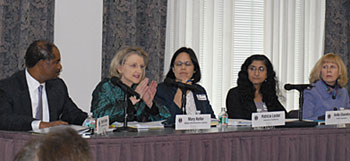
Delinquency Prevention

The October 21, 2011, meeting of the Coordinating Council on Juvenile Justice and Delinquency Prevention covered a range of topics, including the educational and behavioral health needs of children in military families, updates on the Supportive School Discipline Initiative, and an overview of the activities of the White House Council for Community Solutions. Following are a few highlights of the meeting:

The October 21, 2011, meeting of the Coordinating Council included a panel discussion about strengthening military families. The panel's moderator was Robert L. Gordon, III, Deputy Assistant Secretary of Defense for Military Community and Family Policy (on the far left). Other panelists included (from l. to r.) Dr. Mary Keller, President and CEO, Military Child Education Coalition; Dr. Patricia Lester, Associate Professor of Child and Adolescent Psychiatry and Director of Welcome Back Veterans Family Resilience Center, University of California, Los Angeles; Dr. Anita Chandra, Manager, Behavioral and Social Sciences Group, RAND Corporation; and Barbara Thomson, Director, Office of Family Policy/Children and Youth, U.S. Department of Defense.
- Robert L. Gordon, III, Deputy Assistant Secretary of Defense for Military Community and Family Policy, led a panel of experts discussing the topic of strengthening military families. In one discussion, Dr. Anita Chandra, Manager of the RAND Corporation's Behavioral and Social Sciences Group, summarized findings from two recent RAND studies that shed light on the needs of children with deployed parents.
- One study found that, although these youth function at or above the U.S. average in academic engagement and peer relationships, they function below average in family relationships, and have more anxiety and emotional difficulties compared to youth in civilian families. The other study found that children in military families report persistent emotional difficulties, particularly with more cumulative deployment months; that relationships between returning service member parents and children can be strained on account of poor communication and developmental changes; and that schools continue to struggle in providing academic and emotional support for students during moves and deployment transition periods. The study recommended that available resources be targeted to addressing these three priority issues.
- Kristen Harper, Senior Policy Advisor, U.S. Department of Education, provided updates on the Supportive School Discipline Initiative, a collaboration between the Education and Justice Departments to target school disciplinary policies and in-school arrests that can push youth out of school and into the justice system.
- Building consensus for action among federal, state, and local education and justice stakeholders. OJJDP, at the end of fiscal year 2011, awarded $400,000 to the Council of State Governments to undertake the consensus-building work. Consensus-building meetings will be held nationwide.
- Collaborating on research and data collection that may be needed to inform this work, such as evaluations of alternative disciplinary policies and interventions.
- Developing guidance to ensure that school discipline policies and practices comply with the nation's civil rights laws and to promote positive disciplinary options to both keep children in school and improve the climate for learning.
- Technical assistance and outreach to promote awareness and knowledge about evidence-based and promising policies and practices among state judicial and education leaders.
- Leslie Brossiere, Executive Director of the White House Council for Community Solutions, offered an overview of the council's mission and activities. Roughly 4 million young adults ages 16 to 24 are disconnected from both education and the workforce, and the council's current focus is to develop a federal agenda to help connect these young people to education, employment, and ongoing civic participation.
Since the initiative was launched in July 2011, 30 federal staff have been convened and are now participating in workgroups focused on each of the project's four priorities:
Established in December 2010 by President Barack Obama, the White House Council for Community Solutions is composed of more than 25 leaders from the public and private sectors. First Lady Michelle Obama is the council's honorary chair. As a first step in determining the direction of the council, listening sessions with more than 250 stakeholders were held from February to June 2011 across the country. "Government can't do this alone," Ms. Brossiere said. "It's an all hands on deck approach, involving all citizens and all sectors—philanthropy; nonprofit organizations; juvenile justice; federal, state, and local officials; business; and youth. We want them all at the table."
Meetings of the council are open to the public. Visit the Web site to learn more about the council and read minutes from past meetings.
The Coordinating Council on Juvenile Justice and Delinquency Prevention is an independent body within the executive branch of the federal government operated under the Federal Advisory Committee Act. The council's primary functions are to coordinate federal juvenile delinquency prevention programs, federal programs and activities that detain or care for unaccompanied juveniles, and federal programs relating to missing and exploited children.
The council is made up of 22 members—13 ex officio and affiliate members and 9 practitioners. The ex officio members are: the Attorney General; the Administrator of the Office of Juvenile Justice and Delinquency Prevention; the Secretaries of the U.S. Departments of Education, Health and Human Services (HHS), Housing and Urban Development, and Labor; the Assistant Secretary of Immigration and Customs Enforcement in the U.S. Department of Homeland Security; the Director of the Office of National Drug Control Policy; and the Chief Executive Officer of the Corporation for National and Community Service. Affiliate members are the Secretaries of the U.S. Departments of Agriculture, Defense, and the Interior, and the Administrator of the Substance Abuse and Mental Health Services Administration of HHS. The nine juvenile justice practitioner members are appointed by the Speaker of the House of Representatives, the Senate Majority Leader, and the President of the United States.

